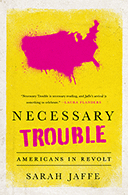Striking against austerity and the Right, with Jane McAlevey
West Virginia’s teachers proved that supermajority strikes can even beat a trifecta-red government, if they bring their community along, argues Jane McAlevey, organizer and author. Teachers, nurses, and other public sector workers, far from being the also-rans of the labor movement, have the power to challenge austerity and to organize their communities. McAlevey explains the difference between organizing and mobilizing, why she’s hopeful about the March For Our Lives and the Poor People’s Campaign, and what to expect from the Supreme Court’s forthcoming Janus decision.
What is interesting to me is that mostly men in our movement over the last 25 years have had a consistent line that the private sector matters more than the public sector and that the private sector is the most important place that we have to do our work. Like, if we are going to re-build the labor movement, it has to happen in the private sector and not until we get the private sector numbers back up to something close to the public-sector numbers can we win again. I have taken a decidedly fairly public different position, which is one sector does not matter more than the other and, in fact, where I have been evolving to lately is that if anything the public sector matters more. Not only because it is where we still have, until Janus, a majority of the membership of the labor movement.
But, it is actually also, I argue that it is the mission-driven, largely female, often people of color – certainly not in West Virginia, but elsewhere – who are the people suffering the consequences of austerity and who have the capacity to fight back because of those incredibly deep structural relationships they have with either their patients in the healthcare sector or their clients in the home care part of the healthcare sector. People who they serve and take care of or the students and the parents and the families in the case of education workers. Austerity is going after them. The austerity front is around healthcare and education. That is where massive cutbacks are happening.
…
Everywhere in the world, despite a multi-million dollar attempt, from Waiting for Superman on, to decimate the image of teachers. Even though the pages of The New York Times or any other mainstream liberal media outlet occasionally will agree, ordinary parents in strike after strike choose to stand with their teachers. Students stand with their teachers. No matter how many millions of dollars they try and use to degrade and attack and insult every educator–they haven’t moved on nurses yet, but as I am studying the attack on teachers, it is like it doesn’t matter how much money they waste, the relationship that is forged every day organically between mission-driven workers, workers who care deeply about their work, mostly female in the healthcare and education sector, is like an inseparable bond. That is why it becomes organizing and not just mobilizing, because they are bringing hundreds of thousands more people into the struggle and helping them understand who is to blame for the pain in their lives.
Up at The Progressive
Up at Truthout
Interviews for Resistance is a syndicated series of interviews with organizers, agitators and troublemakers, available twice weekly as text and podcast. You can now subscribe on iTunes! Previous interviews here.
